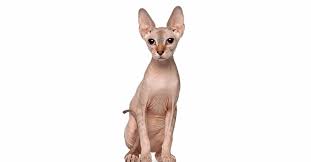
Sphynx
Conditions of detention
Sphynx cats thrive in indoor environments where they can be kept warm and comfortable, as they lack a protective fur coat. They enjoy being part of the family and require an environment where they can interact with their human companions and explore their surroundings.
Useful Fact:
Sphynx cats are known for their sociable and affectionate nature. They often seek out attention and enjoy cuddling with their owners to stay warm, making them excellent companions for those who enjoy close interaction with their pets.
Nutrition and diet
Sphynx cats require a balanced diet rich in protein and fat to maintain their energy levels and muscle mass. Due to their lack of fur, they tend to have a higher metabolism, needing more calories than other cats. It’s essential to provide them with high-quality commercial cat food, and some owners opt for a raw diet after consulting with a veterinarian.
Useful Fact: Sphynx cats often eat more than other breeds due to their high metabolic rate, which helps them stay warm.
Health
Sphynx cats are generally healthy but are prone to certain genetic conditions like hypertrophic cardiomyopathy (HCM), a heart disease. Regular veterinary check-ups are crucial to monitor their health and catch any issues early.
Useful Fact: Regular echocardiograms are recommended to check for heart health, especially since HCM can be asymptomatic in its early stages.
Grooming and care
Although Sphynx cats lack fur, they require regular grooming to manage the oils that their skin produces. Weekly baths are necessary to prevent oil buildup, and regular ear cleaning and nail trimming are also important.
Useful Fact: Their skin can be sensitive to the sun, so they should be protected from direct sunlight to avoid sunburn.
Education and training
Sphynx cats are intelligent and can be trained to perform simple commands and tricks. Positive reinforcement techniques, such as treats and praise, work best with this breed.
Useful Fact: They are quick learners and can be taught to use the litter box, scratch posts, and even walk on a leash with proper training.
Toys and entertainment
Sphynx cats are playful and energetic, requiring a variety of toys to keep them mentally and physically stimulated. Interactive toys, puzzle feeders, and climbing trees are great choices to keep them entertained.
Useful Fact: They enjoy the company of their owners during playtime, which helps strengthen the bond between cat and owner.
Safety
Due to their lack of fur, Sphynx cats are more sensitive to temperature changes. They should be kept indoors in a stable, warm environment to avoid hypothermia or overheating.
Useful Fact: In cooler climates, dressing them in cat sweaters can help keep them warm.
Accessories
Sphynx cats benefit from having a range of accessories, including cozy blankets, heated beds, and cat-friendly clothing to maintain their body temperature.
Useful Fact: Heated beds can provide extra warmth, making them a favorite resting spot for Sphynx cats.
Socialization
Sphynx cats are social animals that enjoy human companionship and interaction. They thrive in homes where they are not left alone for long periods and can interact with other pets and family members.
Useful Fact: They often follow their owners around the house and enjoy being involved in daily activities.
Travel and Transportation
When traveling with a Sphynx cat, it’s essential to ensure their comfort and safety. A well-ventilated carrier, familiar blankets, and regular breaks during long journeys help reduce stress.
Useful Fact: They may require extra warmth during travel, so carrying a blanket or a sweater can be helpful.
Behavior and psychology
Sphynx cats are known for their affectionate and social nature. They form strong bonds with their owners and can exhibit separation anxiety if left alone for too long.
Useful Fact: Providing them with plenty of mental and physical stimulation can help mitigate anxiety and promote a healthy, happy demeanor.
Legal aspects
Ownership of a Sphynx cat involves understanding local pet regulations, including microchipping, vaccinations, and spaying or neutering. Some areas may have specific laws regarding exotic pets.
Useful Fact: Ensuring your Sphynx cat is microchipped and has up-to-date identification helps in case they get lost.


